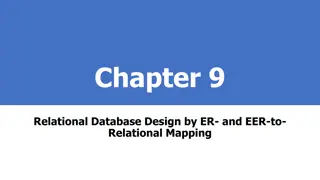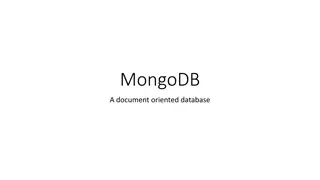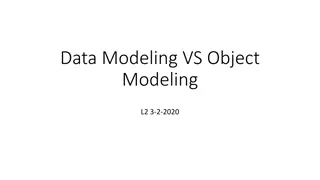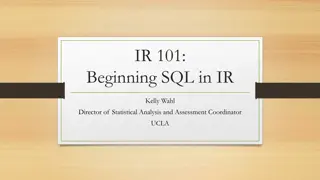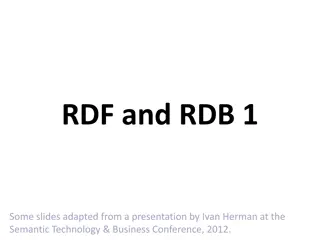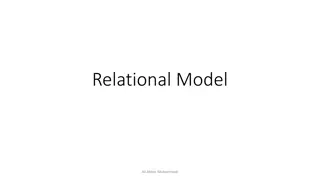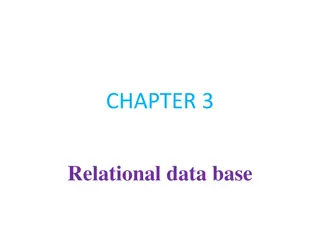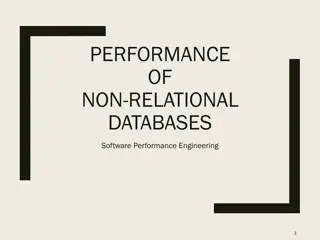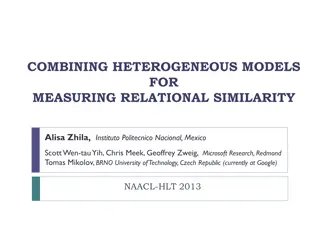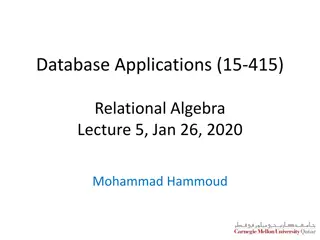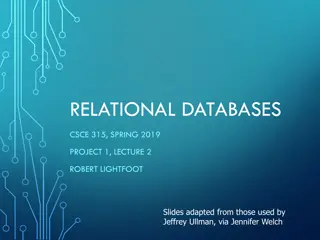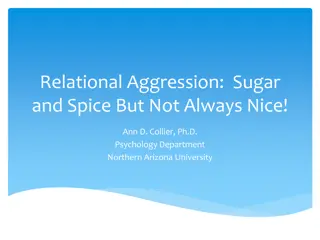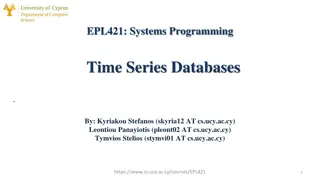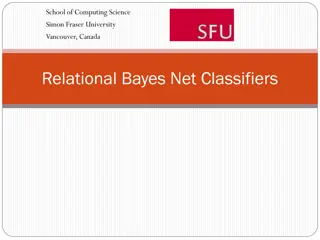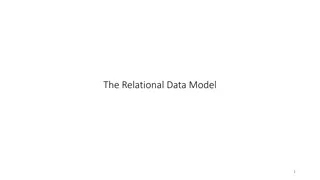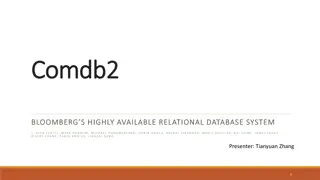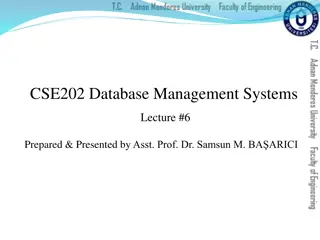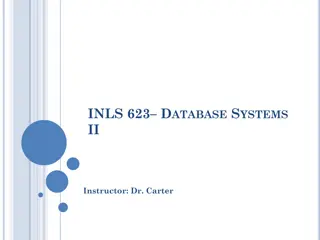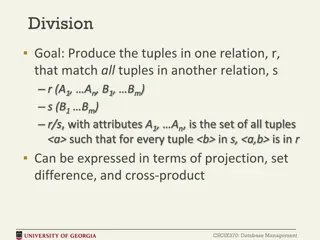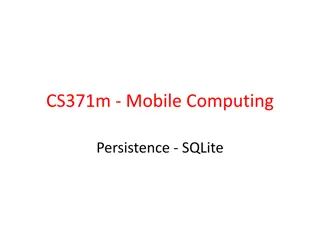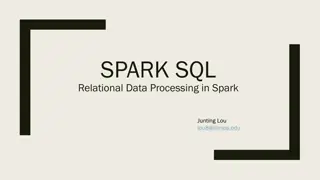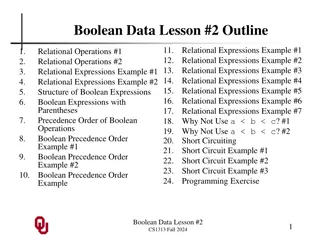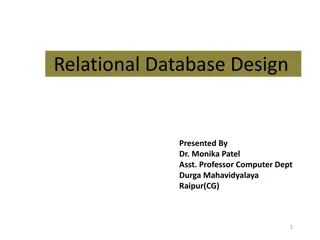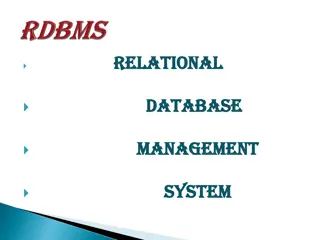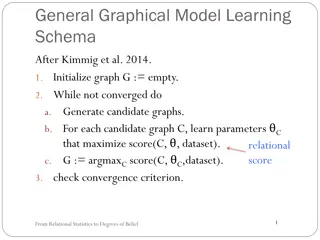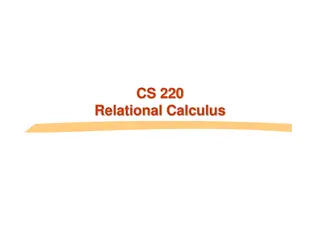Progressive Approach to Relational Entity Resolution
In this research paper authored by Yasser Altowim, Dmitri Kalashnikov, and Sharad Mehrotra, a progressive approach to relational entity resolution is presented. The study focuses on balancing cost and quality in entity resolution tasks for relational datasets. The goal is to develop a method that ac
1 views • 20 slides
Tensions in UK Fire Prevention: Transactional vs. Relational Approaches
Exploring the tensions between transactional and relational approaches in UK fire prevention, this presentation shares insights from a case study at Nottinghamshire Fire and Rescue Service. Seeking feedback on relevant literature, it delves into the NFCC Person-Centred Framework, literature on fire
3 views • 16 slides
Understanding Relational Database Design and Mapping Techniques
Explore the process of mapping Entity-Relationship (ER) and Enhanced Entity-Relationship (EER) models to relational databases. Learn about relational model concepts, mapping algorithms, and the goals and steps involved in the mapping process. Discover how to preserve information, maintain constraint
3 views • 42 slides
MongoDB vs. Relational Databases: Myth vs. Reality in NoSQL Design
MongoDB is a document-oriented database that challenges traditional relational databases by offering flexible schema designs. While myths suggest no need for schema design or relationships in MongoDB, the reality emphasizes the importance of thoughtful schema design and choice in data relationships.
2 views • 21 slides
Understanding Keys in Relational Databases
Keys play a crucial role in relational databases by uniquely identifying records and establishing relationships between tables. Primary keys are essential for data integrity, ensuring each entity is identified uniquely. Learn about primary keys, types of keys, and examples of creating tables with pr
0 views • 57 slides
Understanding Data Modeling vs Object Modeling
Data modeling involves exploring data-oriented structures, identifying entity types, and assigning attributes similar to class modeling in object-oriented development. Object models should not be solely based on existing data schemas due to impedance mismatches between object and relational paradigm
0 views • 17 slides
Introduction to SQL: Learn the Basics and Beyond
Explore the world of Structured Query Language (SQL) with this comprehensive guide. Discover what SQL is, its history, usage, and how to learn it on your own through free online tutorials. Understand the properties of relational databases and get insights into designing a relational database. With S
0 views • 29 slides
Understanding Enduring Relational Themes in Psychotherapy
Exploring the concept of Enduring Relational Themes (ERTs) in psychotherapy, this content delves into the history of transference in Gestalt therapy, contemporary psychoanalysis perspectives, forms of transference, and Lynne Jacobs' insights. It highlights how ERTs manifest, their impact on therapy,
5 views • 9 slides
Exporting Relational Data to RDF: Strategies and Considerations
Explore the process of mapping relational data to RDF, including the choice of RDF vocabulary, defining mapping techniques, and exporting strategies. Learn about RDB systems that support RDF, direct mapping approaches, and the use of hybrid storage solutions. Discover how to bridge SPARQL and SQL fo
1 views • 13 slides
Understanding the Key Concepts of Relational Databases
Introduction to the fundamental concepts of relational databases including the relational model proposed by Edgar F. Codd, relation schemes, relation instances, keys for a relation, and more. Discover the significance of keys, candidate keys, superkeys, and primary keys in database design.
0 views • 27 slides
Understanding Relational Databases and File-Based Systems
This chapter delves into the fundamental concepts of databases, comparing them to file-based systems, and highlighting the significance of relational databases in modern integrated AISs. It explores the difference between logical and physical views of databases, introduces key concepts such as DBMS
0 views • 70 slides
Modern Approaches to Database Scalability and Performance Engineering
Explore the challenges and solutions for horizontally scaling RDBMS like PostgreSQL on Amazon servers, considering factors such as data distribution and multi-tenancy. Delve into the complexities of H-Scaling and the trade-offs between relational and non-relational databases in terms of performance
3 views • 16 slides
Enhancing Relational Similarity Measurements: A Model Combination Approach
This study explores combining heterogeneous models for measuring relational similarity, showcasing the importance of general relational similarity models. It discusses the degrees of relational similarity and introduces a directional similarity model that outperforms previous systems. The approach l
0 views • 23 slides
Reactor: A Case for Predictable, Virtualized Actor Database Systems
Exploring the integration of actor programming models in modern relational databases to achieve high performance. The focus is on addressing challenges related to stored procedures, data partitioning, modularity, isolation, software engineering, and performance. The talk outlines motivation, the rel
0 views • 41 slides
Understanding Relational Query Languages in Database Applications
In this lecture, Mohammad Hammoud discusses the importance of relational query languages (QLs) in manipulating and retrieving data in databases. He covers the strong formal foundation of QLs, their distinction from programming languages, and their effectiveness for accessing large datasets. The sess
0 views • 39 slides
Understanding Many-to-Many Relationships in Relational Databases
Exploring the intricacies of many-to-many relationships in database design through the use of associative entities. Learn why a third entity is essential, how to create relational databases with foreign keys, and the importance of identifying relationships. Dive into MySQL Workbench symbols and the
0 views • 26 slides
Challenges and Innovations in Relational Engine Algorithms
Exploring the complexity of processing graph data in relational query engines, this content delves into the challenges faced, practices adopted in academia, and innovative solutions like LMS-NPRR, trie join, and specialized data structures. It discusses the difficulties in handling acyclic vs. cycli
0 views • 27 slides
Advanced Techniques in Relational Data Outlier Detection
This document delves into cutting-edge methods for outlier detection in relational data, focusing on profile-based and model-based approaches such as leveraging Bayesian networks, feature generation, and individual feature vector summarization. The examples provided showcase the application of these
1 views • 30 slides
Understanding Relational Evangelism and Sharing Your Faith Testimony
Discover the essence of relational evangelism and effectively articulating your testimony of faith. Explore the significance of the Gospel message and different evangelistic approaches while delving into the concept of personal evangelism without imposition. Embrace the idea of faith arising in vari
0 views • 32 slides
Exploring Data Beyond the Relational Model
Serge Abiteboul delves into the world beyond the relational model, challenging established norms in industry and academia, aiming to facilitate application development and enhance performance. The lecture covers topics such as organization trees, XML graphs, object databases, NoSQL, OLAP, and more,
0 views • 52 slides
Fundamentals of Relational Databases in CSCE 315 - Lecture Highlights
Introduction to relational databases covering topics such as relational data model, schemas, converting from entity-relationship model, entity sets, relations, relationships, combining relations, and practical examples. Learn about storing data in tables, attributes, database organization, and the i
1 views • 18 slides
Understanding Relational Aggression in Girls: The Impact on Social Relationships
Relational aggression, a form of social bullying, can have detrimental effects on girls' social relationships and self-esteem. This type of indirect aggression includes behaviors like exclusion, spreading rumors, and social manipulation. Understanding and assessing relational aggression is crucial f
0 views • 22 slides
Enhancing Spatial Data Analysis in QGIS
Explore the integration of relational databases with QGIS to facilitate efficient spatial data analysis. Discover the importance of recognizing spatial relationships within data sets and the solutions to enhance QGIS for relational datasets. Overcome challenges and delve into the intersection and su
0 views • 25 slides
Overview of Time Series Databases in Systems Programming
This content delves into the intricacies of time series databases within the realm of systems programming, comparing options like InfluxDB. It discusses relational vs. tagset data models, setup procedures, API usage, security considerations, advantages and disadvantages of relational data models, an
0 views • 82 slides
Understanding Relational Bayesian Networks in Statistical Inference
Relational Bayesian networks play a crucial role in predicting ground facts and frequencies in complex relational data. Through first-order and ground probabilities, these networks provide insights into individual cases and categories. Learning Bayesian networks for such data involves exploring diff
0 views • 46 slides
Understanding the Relational Data Model and Database Concepts
Delve into the world of relational data modeling, database integrity rules, and structure. Explore how a university database in MS Access utilizes relational tables and fields to store information. Learn about the key terminology associated with relational databases, such as primary keys, foreign ke
0 views • 69 slides
Highly Available Relational Database System - Key Components and Design Choices
A comprehensive overview of a highly available relational database system, focusing on scalability, concurrency control options, data replication, availability strategies, failure handling, and full transactional support. The content discusses essential elements such as optimistic concurrency contro
0 views • 21 slides
Women's Self-Esteem and Relationship Behavior Study: Insights and Implications
This study explores the relationship between women's self-esteem, relational behavior, and perceptions of relational desirability. Findings indicate that self-esteem does not significantly predict relational behavior, with women feeling less desirable than their partners reported investing more in r
0 views • 9 slides
Object-Oriented Database Concepts and Limitations in Relational Models
Object-oriented database concepts are introduced as an alternative to relational models, addressing limitations such as lack of support for complex data structures, generalization, specialization, and aggregation. The shift towards a more data-centric approach in information systems development is d
1 views • 82 slides
Understanding Relational Child and Adolescent Psychotherapy
Explore the concepts of relational child and adolescent psychotherapy involving attachment patterns, intersubjectivity, corrective emotional experiences, and the role of the relational psychodynamic psychotherapist in providing corrective emotional experiences essential for the child's development.
0 views • 25 slides
Understanding Relational Database Management Systems
Dive into the world of database systems with a focus on relational structures, entities, properties, and relationships. Explore the types of database systems, the representation of entities in tables, and the constraints and types of relationships that govern data connectivity. Gain insights into or
0 views • 17 slides
Understanding Division in Relational Algebra
Division in relational algebra is a fundamental operation used to produce tuples in one relation that match all tuples in another relation based on certain conditions. It involves expressing the desired result in terms of projection, set difference, and cross-product operations. The process ensures
0 views • 13 slides
Introduction to Relational Databases and SQLite for Mobile Computing
Covering the basics of relational databases, SQL, and SQLite, this content provides an overview of database management systems, their history, and the key concepts related to data storage and retrieval. It also touches on the practical aspects of working with SQLite in Android applications, outlinin
0 views • 61 slides
Understanding Data Modeling for Optimal Performance
Data modeling is crucial for efficient relational and non-relational databases. It involves making decisions on normalization, denormalization, embedding, and referencing to optimize performance and minimize costs. By strategically structuring data, you can achieve the benefits of joins without the
0 views • 36 slides
Overview of Spark SQL: A Revolutionary Approach to Relational Data Processing
Spark SQL revolutionized relational data processing by tightly integrating relational and procedural paradigms through its declarative DataFrame API. It introduced the Catalyst optimizer, making it easier to add data sources and optimization rules. Previous attempts with MapReduce, Pig, Hive, and Dr
0 views • 29 slides
Understanding Relational Operations for Boolean Expressions
Learn about relational operations in Boolean expressions through examples and explanations. Discover how to compare numeric operands to produce Boolean results, covering equal to, not equal to, less than, less than or equal to, greater than, and greater than or equal to operations. The content inclu
0 views • 25 slides
Understanding Relational Database Design Fundamentals
This content delves into the crucial aspects of relational database design, including normalization, pitfalls, RDBMS design issues, and the overall database design process. It emphasizes the need for well-structured relation schemas to minimize redundancy, ensure data integrity, and facilitate effic
1 views • 53 slides
Evolution of Database Management Systems
The evolution of Database Management Systems (DBMS) began with file systems and punched cards in the 1950s, followed by hierarchical and network models in the 1960s and 1970s. The 1980s introduced relational databases like Ingres, Oracle, DB2, and Sybase. The 1990s saw the rise of object-oriented an
0 views • 31 slides
Learning Bayesian Network Models from Complex Relational Data
Delve into the process of learning Bayesian network models from complex relational data, extending traditional algorithms to suit relational data structures. Explore key concepts like likelihood functions, graphical model initialization, and parameter learning for effective model fitting.
0 views • 20 slides
Introduction to Relational Calculus and Algebra in Database Management
Explore the fundamental concepts of relational calculus and algebra in the domain of database management. Understand the differences between declarative and imperative query languages and learn to retrieve information using practical examples and theoretical frameworks such as tuple relational calcu
0 views • 23 slides


